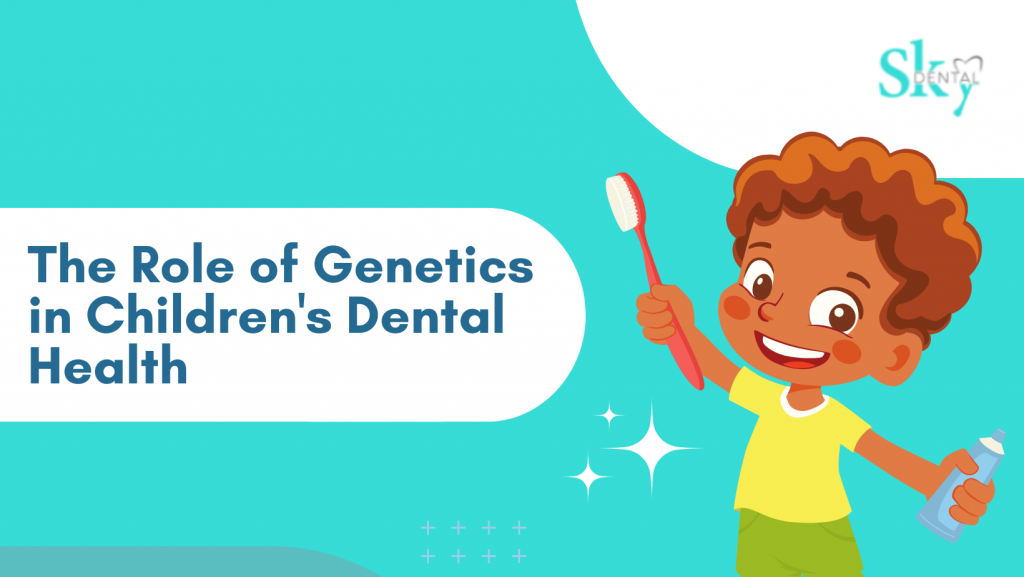Dental health is a crucial aspect of a child’s overall well-being, and its impact goes beyond just a beautiful smile. Proper dental care ensures the ability to chew, speak, and maintain essential nutrition. While dental practices such as brushing, flossing, and regular check-ups are vital, the role of genetics in children’s dental health has become an intriguing subject of research.
Understanding Dental Health
Dental health refers to the state of the oral cavity, including the teeth, gums, and surrounding tissues. Good dental health ensures proper oral function and aesthetics, while poor dental health can lead to various issues, such as cavities, gum disease, and malocclusions.
How Genes Influence Dental Development
Genetics plays a significant role in determining dental traits such as the size, shape, and alignment of teeth. Genes also influence the development of primary and permanent teeth during childhood. This genetic influence begins before birth, as the formation of tooth buds occurs during early fetal development.
Genetic Predisposition to Tooth Decay
Some children may inherit genes that make their tooth enamel more susceptible to decay, increasing the risk of cavities despite proper oral care. Enamel, the outer protective layer of teeth, acts as a shield against bacteria and acid attacks. Genetic variations can make some individuals more prone to enamel erosion, leading to cavities.
Genetic Influence on Malocclusions
Malocclusions, which are misalignments of the teeth and jaws, can also be influenced by genetic factors. Conditions like crowded teeth, overbites, and underbites may be passed down from parents to children. Identifying these genetic predispositions early on can help in planning for potential orthodontic treatments.
Environmental Factors and Their Impact
Apart from genetics, a child’s diet and oral care habits play a significant role in their dental health. Consuming excessive sugary or acidic foods and beverages can contribute to tooth decay. Additionally, practicing good oral hygiene habits from an early age can prevent dental problems.
The Interplay Between Genetics and Environment
The relationship between genetics and the environment is complex. While genetics may influence dental traits, environmental factors like diet and oral hygiene practices can modify how these genes express themselves. The study of epigenetics further explores how environmental factors can influence gene expression.
Predictive Genetic Testing in Dentistry
Predictive genetic testing allows for the identification of potential dental risks early on, enabling targeted preventive measures. Knowing about genetic predispositions can help parents and dental professionals take necessary precautions and guide children toward better oral health.
Promoting Children’s Dental Health
Early dental care is essential for setting the foundation of good dental health. Regular dental check-ups are crucial for monitoring a child’s dental development and addressing any potential issues promptly. Additionally, educating children and parents about the significance of dental health and proper oral care practices can empower them to take charge of their dental well-being.
Myth vs. Fact: Debunking Misconceptions
Contrary to the belief that “bad teeth run in the family,” genetics is not the sole determinant of dental health. Environmental factors and lifestyle choices also play a critical role. It’s essential to emphasize the significance of proper oral care habits to maintain good dental health.
Conclusion
Understanding the role of genetics in children’s dental health is crucial for parents and dental professionals. While genetics can predispose some children to dental issues, proper preventive measures and oral care habits can mitigate potential risks. By considering both genetics and environmental factors, we can ensure healthier smiles and better overall oral health for children.
Role Of Genetics FAQ
1. Can genetics make children immune to cavities?
Genetics alone cannot make children immune to cavities. While some individuals may have stronger enamel due to genetic factors, regular dental care remains essential to prevent cavities.
2. How can I know if my child has a genetic predisposition to dental issues?
Genetic testing can provide insights into potential dental risks. However, it’s essential to consult with a dental professional to assess overall oral health comprehensively.
3. Can environmental factors override genetic influences?
Environmental factors can modify how genes express themselves. Positive environmental influences, like a healthy diet and good oral hygiene, can improve dental health outcomes.
4. Should I be concerned if my child’s teeth look similar to mine?
Resemblance in dental traits is common among family members due to genetic inheritance. It’s essential to focus on maintaining proper oral care habits for good dental health.
5. Can orthodontic issues be solely attributed to genetics?
While genetics can contribute to orthodontic issues, environmental factors, such as habits like thumb-sucking, can also play a role. Orthodontic treatment can address these issues.


